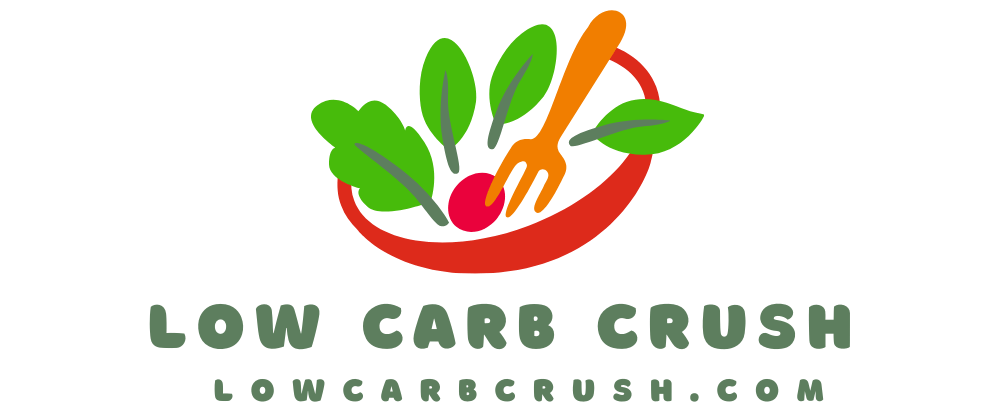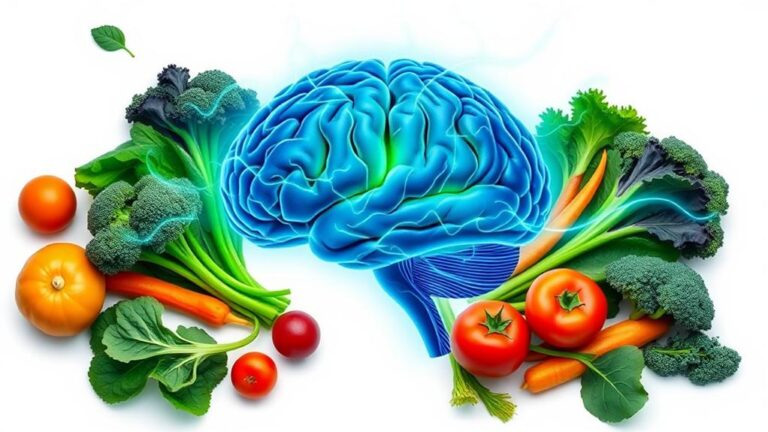When you think about mental clarity, have you considered the role of carbohydrates in your diet? Carbs aren't just a source of energy; they're essential for maintaining peak brain function. By providing a steady supply of glucose, complex carbohydrates can help you avoid those frustrating energy dips that disrupt your focus and productivity. But what happens when you cut carbs too drastically, or rely solely on simple sugars? The impact might be more significant than you'd expect, influencing not just your energy levels but your cognitive performance as well. Let's explore this further.
Understanding Carbohydrates and Brain Function
Recognizing the essential role carbohydrates play in brain function is important for understanding how they affect mental clarity. Carbohydrates are your brain's primary energy source, converting into glucose to fuel cognitive processes. When you consume carbs, your body breaks them down and transports glucose to your brain, ensuring neurons operate efficiently.
Without sufficient carbohydrates, you might experience fatigue, difficulty concentrating, or mood swings. Your brain requires a steady supply of glucose, especially during intense mental tasks. This glucose helps maintain neurotransmitter balance, which is vital for effective communication between neurons.
Different types of carbohydrates exist, and not all are created equal. Whole grains, fruits, and vegetables provide complex carbohydrates that digest slowly, ensuring a steady glucose release. This slow release helps stabilize your energy levels and keeps your mind sharp throughout the day.
In contrast, simple sugars from processed foods can lead to rapid spikes and crashes in energy, negatively impacting your focus and clarity.
In essence, understanding carbohydrates' role in brain function empowers you to make informed dietary choices that support mental clarity. By prioritizing healthy carbs, you can enhance your cognitive performance and overall well-being.
Impact of Low Carb Diets
Adopting a low carb diet can markedly impact your mental clarity and cognitive function. While some people report improved focus and sharper thinking, others may experience a decline in their cognitive abilities, especially during the initial change. This happens because your brain relies heavily on glucose, which carbs provide.
When you cut carbs, your brain might struggle to adapt to using fat as its primary fuel source, leading to moments of fogginess or confusion. The keto diet basics suggest that this adaptation period, often called "keto flu," can last for several days to weeks as your body adjusts to using ketones for energy instead of glucose.
Additionally, the reduction in carb intake can affect your mood and motivation. You might find yourself feeling irritable or lethargic, which can hinder your ability to concentrate on tasks that require deep thinking.
It's essential to recognize that the effects of a low carb diet can vary widely from person to person. Some individuals thrive on low carb eating, while others may find that it hampers their mental performance.
If you're considering this dietary shift, pay close attention to how it affects your brain function. Monitoring your mental clarity can help you determine whether a low carb approach is beneficial for you or if you should adjust your intake to support better cognitive health.
Energy Levels and Cognitive Performance
Energy levels play an essential role in cognitive performance, influencing how well you think, concentrate, and make decisions throughout the day. When your energy levels are high, you're more likely to experience improved focus and mental clarity.
Carbohydrates serve as the brain's primary energy source, providing the glucose necessary for peak brain function. Without enough carbs, you may feel sluggish, leading to decreased cognitive abilities. While low carb diets can offer benefits like weight loss and improved metabolic health, they may impact mental clarity differently than carb-rich diets.
When you consume adequate carbs, your body breaks them down into glucose, which enters your bloodstream and gets transported to your brain. This process fuels your mental processes, helping you tackle complex tasks more efficiently.
Low energy can lead to brain fog, making it difficult to concentrate or remember important details.
It's vital to choose the right types of carbohydrates. Opt for whole grains, fruits, and vegetables, as they release energy slowly and keep your blood sugar stable.
This steady supply of energy helps maintain focus and enhances problem-solving skills. By prioritizing carbs in your diet, you'll likely notice a significant boost in your cognitive performance, allowing you to tackle your daily challenges with clarity and confidence.
The Role of Ketosis
Ketosis plays a significant role in how your body utilizes energy, particularly when it comes to cognitive function. When you enter ketosis, your body shifts from using glucose as its primary fuel source to utilizing ketones, which are produced from fat. This change can lead to increased mental clarity for some people.
Keto diet beginners often experience this shift as their bodies adapt to the new low-carb, high-fat eating plan.
In a state of ketosis, your brain receives a steady supply of energy from ketones, which can be more efficient than relying on glucose. This process may help stabilize your mood and enhance focus, especially during tasks that require deep concentration. You might notice that your thoughts feel sharper and your decision-making improves when you're in ketosis.
However, it's vital to understand that moving into ketosis can take time, and initially, you might experience symptoms like fatigue or brain fog, often referred to as the "keto flu."
Once your body adapts, though, many individuals report feeling more alert and mentally agile.
While ketosis can offer cognitive benefits, it's important to evaluate your overall dietary choices and how they align with your mental clarity goals. Staying informed about your body's responses will help you make the best decisions for your cognitive health.
Food Choices for Mental Clarity
When it comes to boosting your mental clarity, the food choices you make can have a profound impact. Incorporating complex carbohydrates into your diet is crucial, as they provide a steady release of glucose, your brain's primary energy source. Foods like whole grains, oats, and brown rice can help maintain consistent energy levels, enhancing your focus and cognitive function.
Don't forget about fruits and vegetables! Their rich fiber content and necessary vitamins support brain health. Berries, particularly, are packed with antioxidants that may improve communication between brain cells, further sharpening your clarity.
Leafy greens, like spinach and kale, are also essential, as they contain nutrients linked to cognitive performance.
Healthy fats are equally important. Omega-3 fatty acids, found in fatty fish like salmon, walnuts, and flaxseeds, support brain function and reduce inflammation.
Pairing your carbs with protein can stabilize your blood sugar and sustain your energy levels. Consider snacks like yogurt with berries or whole-grain toast with avocado.
Conclusion
So, while you might think cutting carbs is the key to sharper thinking, it's actually the opposite. By fueling your brain with the right carbohydrates, you release better focus and memory. It's ironic, isn't it? The very foods some dismiss as "bad" are essential for mental clarity. Embrace whole grains, fruits, and veggies, and watch your cognitive performance soar. Remember, sometimes less isn't more; in this case, a little carb love goes a long way.



